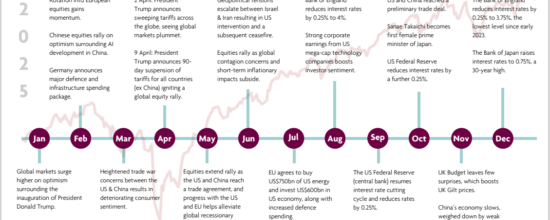Market Update: Renewed hopes for the new year
To download the PDF click here.
Further falls in the rate of inflation and China’s decision to relax its Covid restrictions lifted the market’s mood at the start of the year, although there’s ongoing uncertainty about the economic outlook.
There was an optimistic market mood coming into 2023, buoyed by expectations that many central banks may be able to slow the pace of interest rate rises now that inflation has probably peaked. Notably, the US consumer price index fell to 6.5%, as a decline in energy prices eased the cost of living. This figure marked the lowest reading in over a year and is the sixth consecutive monthly decline.
Other economic data was mixed. Unemployment remains low and US companies continued to create new jobs. Corporate earnings data showed that the economy grew at an annualised rate of 2.9% between October and December, which is faster than economists forecast. However, retail sales were weaker, which heightened concerns about a possible US recession.
Markets in Europe and the UK followed the US in their optimism early in the month, with the hopes that the inflation shock from higher energy prices is easing. This was reflected in a drop in the annual rate of inflation in the UK, France and Germany in December.
Another factor adding to the market’s optimism over the month was China’s relaxation of its Covid-19 restrictions. Strict lockdowns caused manufacturing activity to fall substantially last year. China’s economy grew by just 3% in 2022, which is the weakest expansion since 1976 apart from 2020.
Government bonds rebound
Global bond markets posted a powerful rebound at the start of the year. They appear to be recovering from last year’s rout, restoring their traditional role as a haven against economic downturn. The recovery has been spurred by a growing conviction that inflation has peaked on both sides of the Atlantic, with the gains driven by a big rally in long-term government debt. Inflation peaking means the market expects interest rates to stabilise in 2023 and possibly even fall. These expectations of interest rates drive bond prices up.
Although the UK’s economy grew by 0.1% in November 2022, boosted by consumers spending more during the World Cup Finals, it was a slower rate of growth than the previous month. The Bank of England maintained its view that the UK is probably set for a recession – defined by two consecutive quarters of contraction. The IMF also forecast a UK recession, adding that it would be the worst-performing major economy this year in terms of growth.
Global leaders and business executives gathered for the annual World Economic Forum in Davos, Switzerland. They ended the week-long event sounding a more optimistic outlook for the global economy than feared. The fight against inflation and climate change were two dominant themes, including President Biden’s controversial pledge in green investment.
The International Monetary Fund (IMF) signalled that it expects some improvement in the global economy in the second half of the year and into 2024. This view is somewhat underlined by recent positive economic data from Europe and the US.



